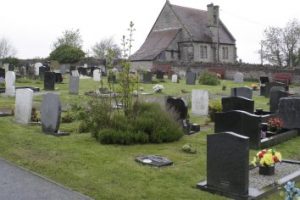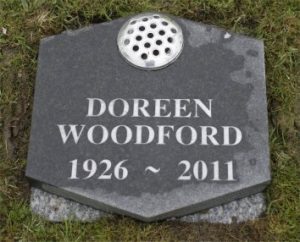Doreen Woodford 18 February 1926 – 31 December 2011
BATOD President 1981-1983
Doreen Woodford, who died on New Year’s Eve at the age of 85, in the Princess Royal Hospital in Telford, was a powerful advocate of the rights of deaf people and served as President of The British Association of Teachers of the Deaf between 1981 and 1983.
As with most of us, her life was influenced by her early years – she was the daughter of a deaf father and hearing mother. As both her father and grandfather were deaf, Doreen began to sign before she could speak. Quite early in her life, she made her way independently, no longer a member of the Brethren, but very much a Christian whose life was governed by Christian values and commitments. By her own efforts she maintained herself and completed her education. Doreen always seemed driven to do well and the right thing: not for herself, but for others. She never sought praise or recognition and she was her own harshest critic.
She had no initial intention of becoming a Teacher of the Deaf. Indeed, she began by training in childcare with Barnado’s. She was only persuaded to help out in teaching deaf children during WWII when so many qualified teachers were in the armed forces.
A professional to her fingertips and a totally dedicated Teacher of the Deaf Doreen was more than that: she was an active member of the Girl Guides, a keen bird-watcher, a lover of the countryside, reading, history and so much more. Possibly not everyone knows that she also took on the role of parent. This was the time before Idi Amin expelled the Asian people from Uganda. At Margate Doreen had been persuaded, by the management of the school, to become the legal guardian to two Muslim deaf boys from East Africa while they were in England, and this meant that she had them in her care in the school holidays. Jack Piggott recalls how he admired the way that Doreen looked after these boys; in term time, they were in school with everyone else and Doreen stood back like any parent; and then in the holidays, they went home to her and had a relaxed time with occasional activities and outings just like any other of the boys. This led Doreen to make her first overseas trip to Tanganyika in the 1950s. From that date she began to take a close interest in the education of deaf children across the world.
She regarded her time at the Royal School for Deaf Children in Margate as particularly important and began to work with children with multiple disabilities. Margate also brought her into contact with deaf children in other parts of the world for the first time. This greatly influenced her subsequent work among deaf people. Some of the overseas children were remote from their families and Doreen’s childcare qualifications proved very helpful.
From the Methodist Church (Margate Circuit) Plan of Services for January to March 1960 we discovered that in 1949 Miss D Woodford, B.A, of the Deaf School, Victoria Road passed her local preaching examinations for the Methodist Church and she was also the Local Preachers’ Secretary. As a lay preacher for deaf people her fluency in British Sign Language, which she ‘spoke’ since childhood, made her popular.
After qualification as a teacher at Manchester University, Doreen then taught for 40 years in schools for the deaf in different parts of the country, including Liverpool and Malvern. She proved a gifted and dedicated teacher and was also noted for running Girl Guide groups for the deaf, encouraging in her Guides a sense of adventure and self-reliance. Doreen Woodford was a lifelong active supporter of Girl Guides, and led many troops of deaf girl pupils during her career. She remained an active member of the Trefoil Guild, and wrote a book on this subject: 75 Remarkable Years: a record of deaf people in the Girl Guide Movement 1910 – 1985 (2005).
Nowadays when the use of sign language is so accepted in the education of deaf children, it can be hard to think back to the attitudes of the past and remember how they persisted right up into the nineteen-sixties. Against this background, when Doreen was granted the Mary Grace Wilkins Travelling Scholarship, she showed boldness and commitment to her beliefs in choosing to research the place of sign language and the quality of its presentation, and use in the classroom at the time. Being a person who used photography constantly in her teaching, she had plenty of experience with the camera to aid her in her research, and then, to make a better record of the signing she observed, she bought cine equipment in order to capture it in motion: she didn’t do things by halves.
Throughout her life, Doreen worked and campaigned to further the profession of Teacher of the Deaf. As a result, she was active in training, writing and publishing materials for training purposes, promoting the work through meetings within the profession and with decision-makers in Government at all levels. She was throughout her career an active member of the British Association of Teachers of the Deaf (BATOD), participating in its training courses, and regularly providing articles for the BATOD Magazine. In 1981 Doreen was elected as the third President of BATOD.
One of the responsibilities that fell to Doreen consequential to her Presidency of BATOD was the organisation of the quinquennial World conference on Deaf Education, held at Manchester University in 1985. This conference attracted over 1000 delegates from countries all over the world and was universally commended for its quality and range of presentations. This was the peak of many seminars and training events which she initiated or in which she participated, many in relation to her international work. She ran seminars in many of the developing countries in which she worked and, in 2002, mounted, together with EENET (the Enabling Education Network of Manchester University), a conference in Birmingham: “What does the South Really Want from the North? : An EENET & Deaf Africa Fund seminar”.
Her work brought Doreen into contact with the voluntary sector organisations set up to promote the interests of the children with which she worked, notably The National Deaf Children’s Society and Sense, then known as The National Deafblind and Rubella Association. Early on, she recognised the importance that parents can have in the education of their children, and sought to have such a contribution recognised by her peers. She participated fully in the work of these organisations, attending and addressing their meetings and conferences, assessing and educating their children, and campaigning with them for improvements in educational services. She was one of a very small group of teachers who were prepared to step outside their ‘comfort zone’ and work with families and their organisations. Now that such cooperation is universal, it is hard to remember how significant such relationships were earlier on in the last century.
Doreen Woodford was an avid historian, and wrote books and monographs on a number of subjects, including Methodism and Girl Guiding. It is in the field of Deaf History that she contributed mostly. She was a founder and extremely active member of the British Deaf History Society and contributed a very large body of useful publications to their list. She scoured libraries and archives across the UK, in order to bring valuable information from past lives to people today. She was commissioned on a number of occasions, in particular by SENSE and thanks to her efforts in the production of two books: ‘Early Photographs of London School for the Deaf, Homerton’ and ‘Touch, touch and touch again’ the work and achievements of deafblind children and their teachers in the 18th and 19th centuries were brought to life and could inform the work of teachers today.
After she retired to Much Wenlock in Shropshire, some 25 years ago, Doreen found time to devote herself to improving the education of deaf children overseas. She travelled widely, aware that in some places deaf people were still stigmatised and denied an education. She joined the Enabling Education Network (EENET) based at Manchester University and spread her inspiring message at several international conferences. Despite increasing age and decreasing mobility Doreen maintained her reputation as an intrepid traveller even to remote and dangerous parts of the world.
Doreen would travel to any country that sought her support in getting services started or moving forward. On several occasions she visited Jalalabad in Afghanistan. There, beneath a burkha, she aided the teaching of deaf girls under the Taliban, when such teaching was banned. She travelled extensively in Africa and Asia, and indeed found herself supporting individuals in some of the most difficult environments. She travelled regularly to Somaliland, Djibouti and Puntland in support of the deaf schools in those regions. She made a major contribution to the development of the school in Hargeisa, and helped to found a new school in Boroma. Her main colleague in Somaliland was an Italian doctor, Annalena Tonelli, who was famous for her work in TB and Aids there – over 30 years. Annalena was assassinated in 2003, and Doreen’s life was similarly under threat. Undeterred, Doreen continued to return to support local teachers and deaf children in developing a Somali sign language even though this had to be under armed guard. Doreen’s efforts became particularly focused in Africa, where she felt the need to be greatest, and where, happily, her advanced age added greatly to her influence. In Malawi, Doreen’s substantial contribution to development of services and provision was recognised by deaf people, parents and professionals by the title ‘Mama Doreen’.
Doreen set up her Deaf Africa Fund “to facilitate the extension and improvement of education for deaf children and young people in Africa”. Every year she raised money through approaches to church congregations and trusts, widening to market stalls and Christmas card sales via her local bookshop etc, for developments in connection with deaf children there. She became hugely concerned about two approaches that were made to her, which were too large for her to tackle unaided.
The first was the situation facing deaf children in Malawi, one of the poorest countries in Africa. There are only four deaf schools serving the whole country and most deaf children do not receive any education at all.
The second was from Tanzania, where the situation is better as regards education, but there is nothing whatsoever to follow on from it. Doreen had worked for many years with UWAVIKA, the National Association of Parents of Deaf Children, a networking, self-help and campaigning organisation. Their dream was to open a Vocational Training Centre for their children so that they could hope to have work following their schooling (plus, indeed, those children who had been denied schooling). She contacted a number of colleagues who had been involved in her field of work and who had recently retired, to see if a new initiative could be launched. This gave rise to the Woodford Foundation, which she agreed should be named in her honour, and which was registered in 2004. She and two others visited both Tanzania and Malawi in December 2004, and the projects were adopted by the trustees on their return. Doreen was the ‘account executive’ for the Tanzanian project, managing it from her home by email and making two visits a year there without fail. She spent time with UWAVIKA, training them in fundraising and capacity building, as they envisage their change from a volunteer agency to a professional service-managing organisation. Thus, at the age of 85 she was still very much in harness, making her bi-annual visits to both Tanzania and Somalia in support of isolated service-providers there. She had returned from a support, training and inspection visit to the workshop and UWAVIKA a short time before her final illness.
British Deaf History Society held Doreen’s interest for many years. She wrote several books collecting together information about Deaf history – the most recent was in production in 2011. The Society honoured Doreen with a ‘This is your life as part of her 80th birthday celebrations. Many friends and former colleagues, both deaf and hearing, travelled great distances to Doreen’s funeral, at which donations were offered to the Deaf History Society in which she had taken such an interest. After the burial ceremony numbers of those who had been influenced and supported by Doreen met to share their experiences and to pay tributes. These were simultaneously translated both to and from sign language. Those present included individuals whose work, in many different parts of the world, as far apart as the Middle East, Africa and Papua New Guinea, had been influenced by Doreen.
Some of the deaf people who were present had been former students, former Girl Guides or Teachers of the Deaf who had been supported by Doreen. Among those paying tribute was Joe Morrissey, Advisor for the Deaf and Deafblind for East Africa, who had travelled from Tanzania. Doreen had visited him to offer her support to deaf education initiatives, even in the last year of her life, returning for the last time to a country she had first visited over 50 years before. All were agreed that Doreen’s passing marked the end of an era in deaf education though her influence with live on, not least through the Woodford Foundation.
It was because of Doreen asking Andrew Broughton and Sue Lewis to help with ‘initiatives’ of the Woodford Foundation precursor charity that Andrew, Sue, Tom and Margaret Kumsang became involved with developments in Malta and Gozo. They remember Doreen fondly echoing the consensus of those present in Much Wenlock – and also those unable to attend saying –
Doreen Woodford – a remarkable lady ‘unselfish of her time, whether locally, nationally or internationally’ daunting, forthright, indomitable and yet behind all that the most thoughtful and gentle person.
This obituary was collated by Ann Underwood (BATOD President 2008-2010) from the many contributions shared by Doreen Woodford’s friends and colleagues.
In particular thanks are due to: Rodney Clark, Jack Piggott, Neil Alderman, Brian Oakley, David Bond, Sue Lewis, Susie Miles and numerous people who spoke after Doreen’s funeral and whose memories helped to colour this obituary.

 Much Wenlock Methodist Church agreed to take on the responsibility for providing a suitable memorial and the upkeep of Doreen’s grave in Much Wenlock.
Much Wenlock Methodist Church agreed to take on the responsibility for providing a suitable memorial and the upkeep of Doreen’s grave in Much Wenlock.
Personal remembrances from around the world
Some photographs which have been sent to share
My Tribute to Doreen Woodford
Delix Missinzo – Malawi I became restless when I heard that Doreen Woodford had died. Though I got the news after a couple of months, I have been compelled by her influence in Africa to write something about her. I had known Doreen in her capacity as trustee of Woodford Foundation whose core objective was to empower institutions and communities working with deaf children. Through this, I first met her in Malawi in August, 2004 when she led a team of four people to share her experience in teaching deaf children. At that time I was a teacher at Mountain View School for the Deaf. She toured several institutions including headquarters of FIC Catholic Brothers ; proprietors of three residential schools of the deaf . She travelled north of the country meeting members of Livingstonia Synod and expressed an idea to help in education of the deaf at Embangweni School for the deaf.
Doreen was a role model and lived explicit life evidenced by what she said. While interacting with Teachers of the Deaf and deaf children at Mountain View, she was accompanied by the proprietors of the school. During the visit she was surprised to hear that many deaf children in Malawi face enormous academic challenges like being kept on long waiting lists because they could only be educated in residential schools. She noted that teaching deaf children through oral approach alone was not enough. Instead she propagated the use of sign language. Quizzed by what she saw at my school, she asked if deaf children go to church and if so, how did they get the scripture? That is why she proposed the use of sign language as a medium of instruction for the deaf because it facilitates communication.
She proposed that there was need to establish pilot unit classes for the deaf in Malawi which was embraced by the government though there is little evidence successful of continuity.
Personally, Doreen was my living testimony as regards to education provision for the deaf. Her passion for Africa lives so many memories. I was inspired by her words to expedite my admission to study at Manchester University in the UK which I did. While there she travelled all way to see me at Grosvenor Student Campus where she spent some hours with me.
But what she liked?
She liked to fight for independence of deaf people in communities by using deaf adults as role models. She liked to work outside the box as seen by her external expedition to Africa and some parts of the world. She liked to be called Ms Woodford. Indeed Ms Woodford was a visionary woman.





